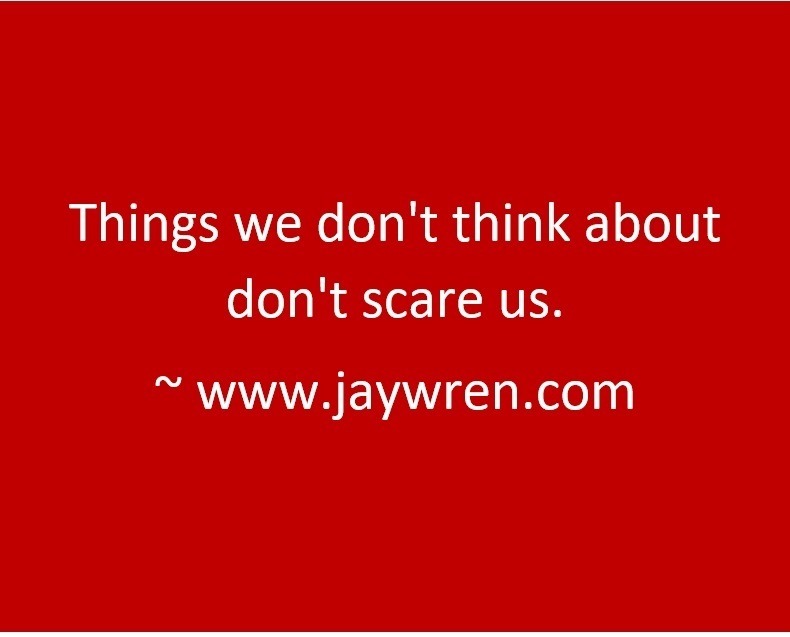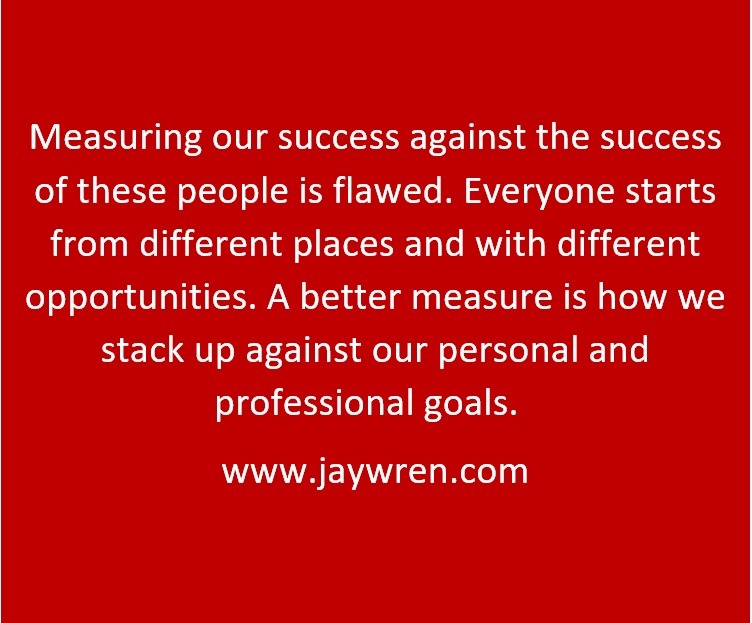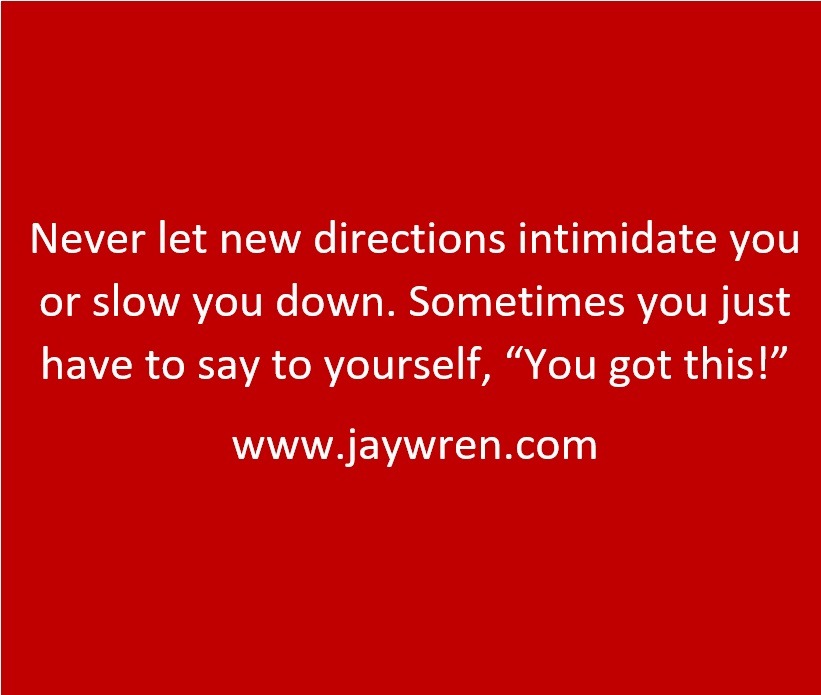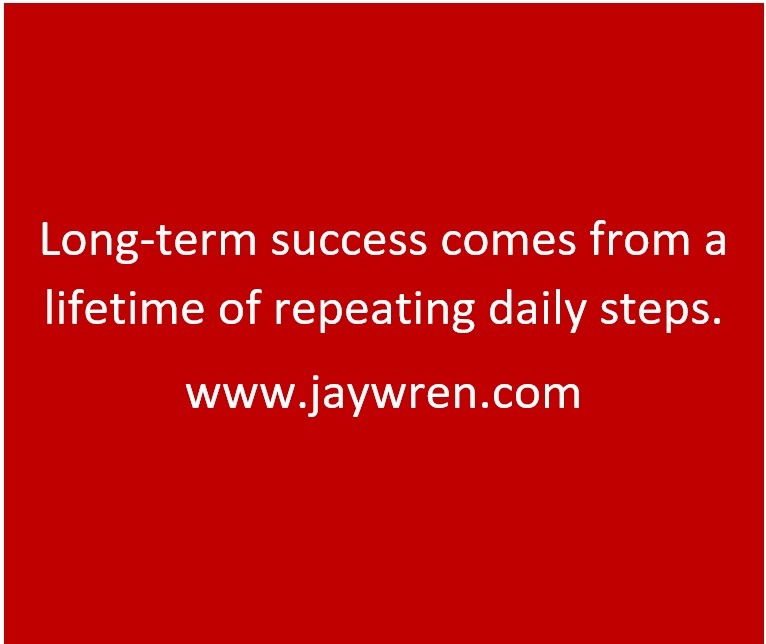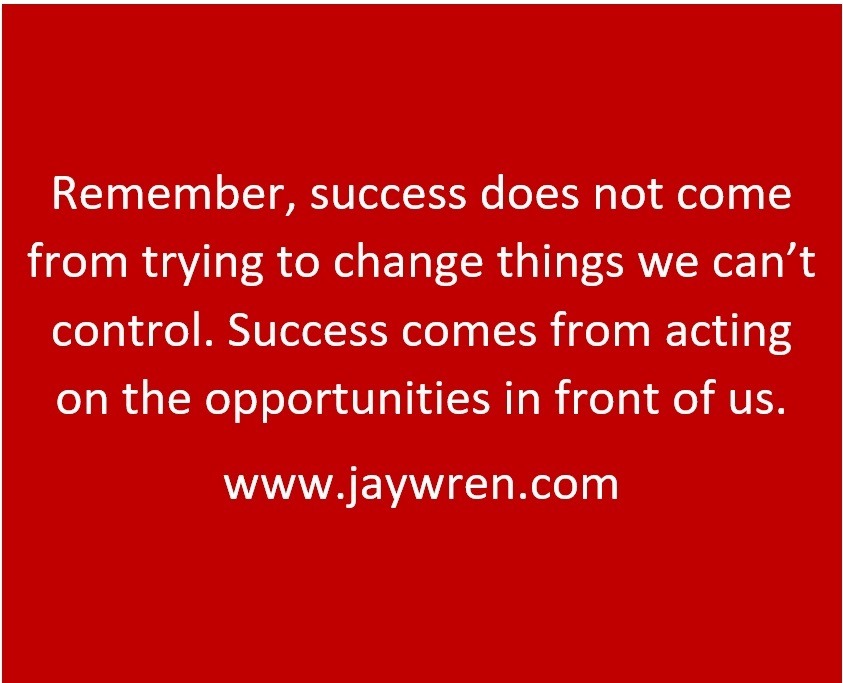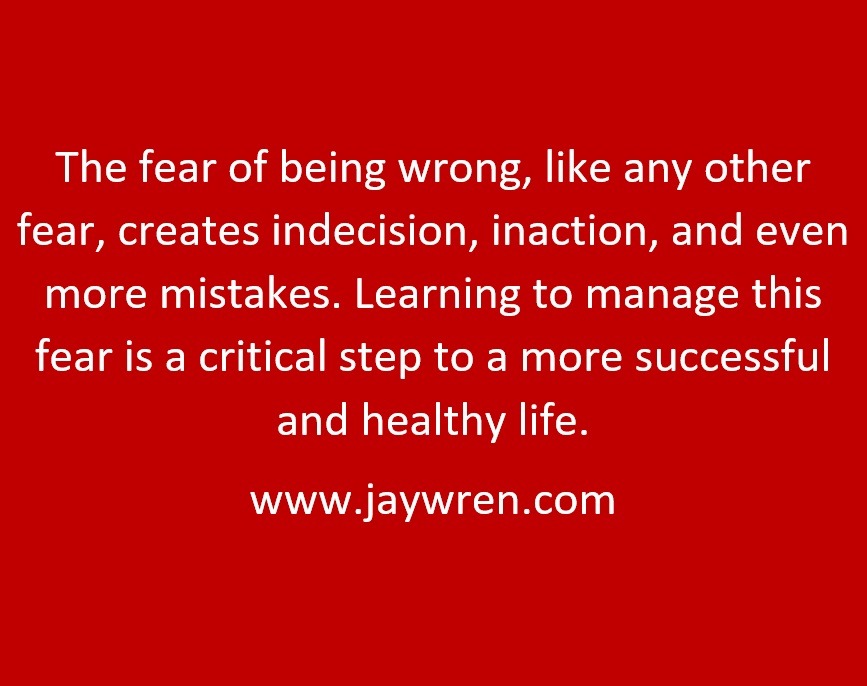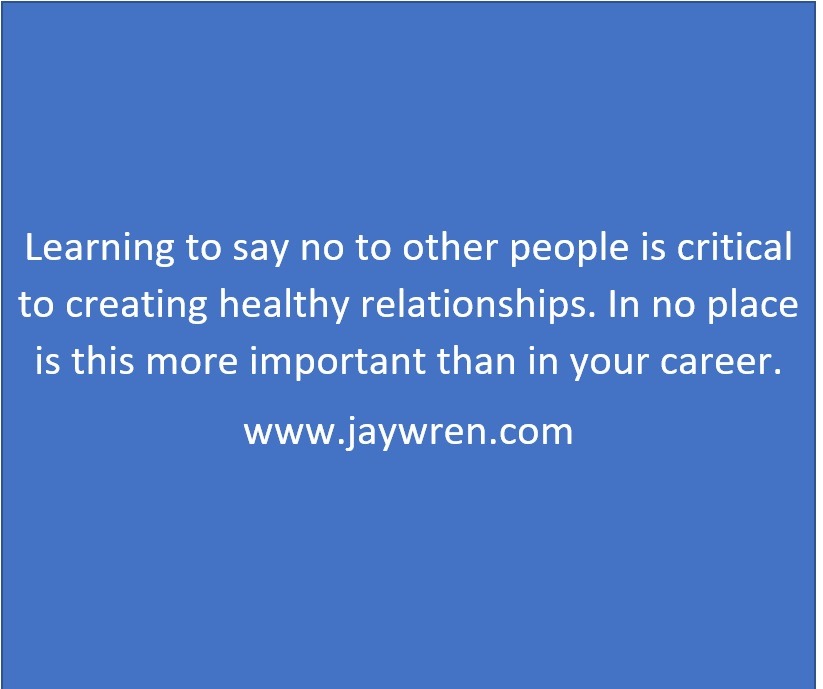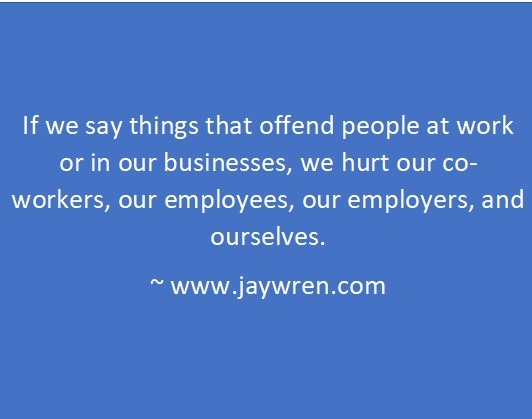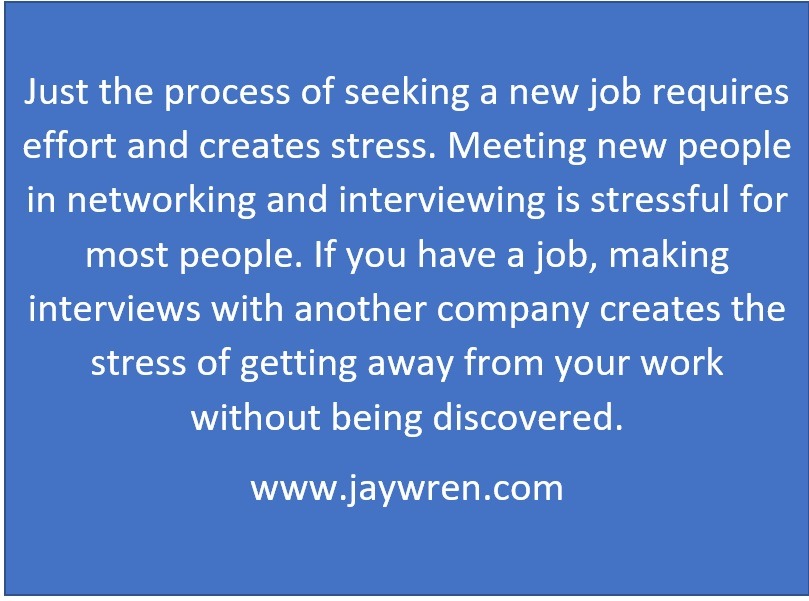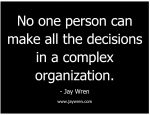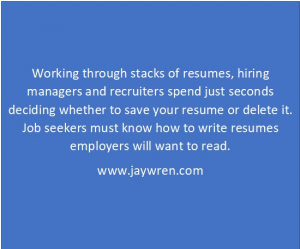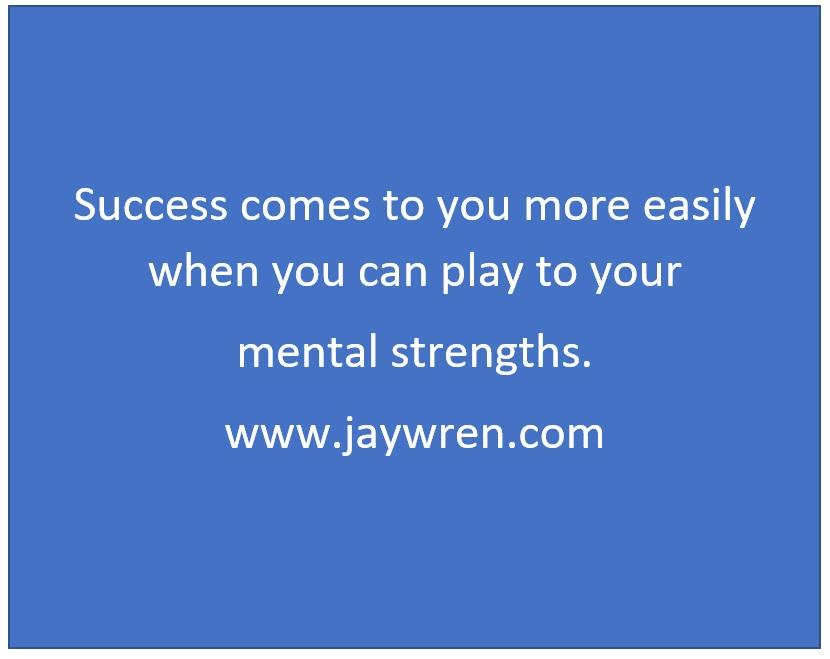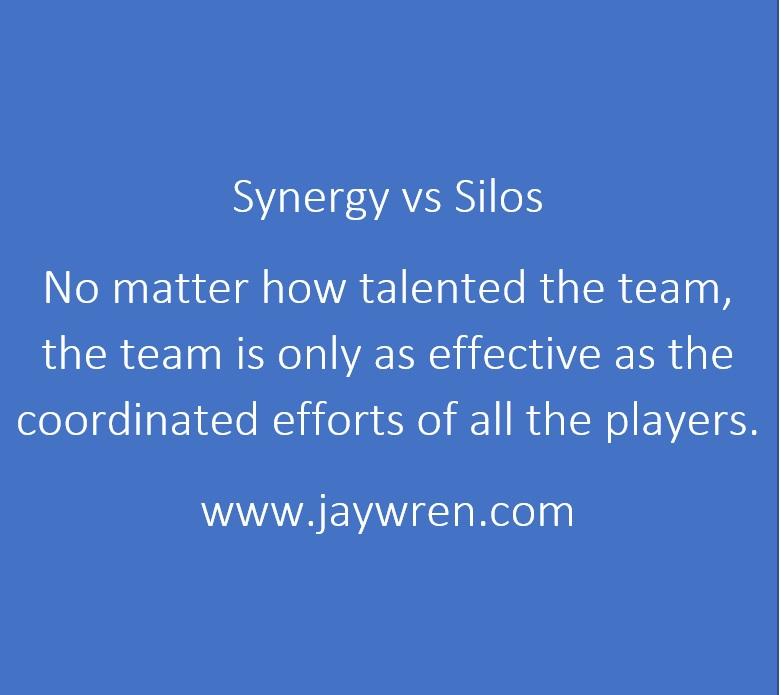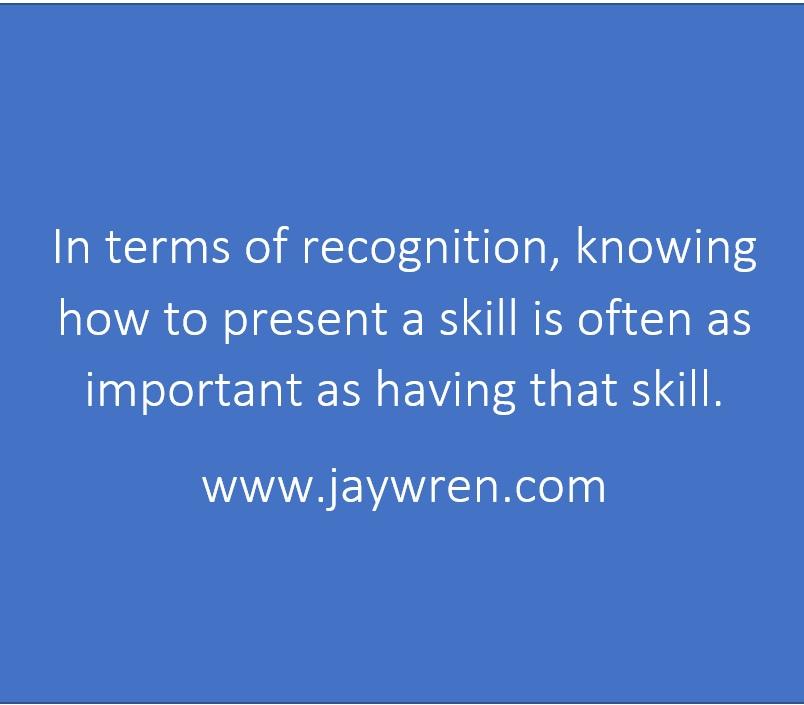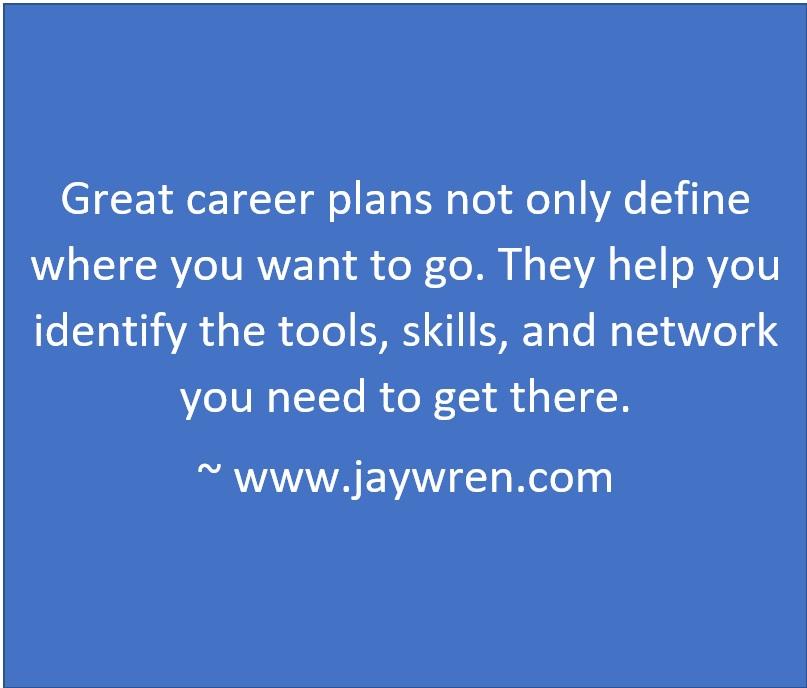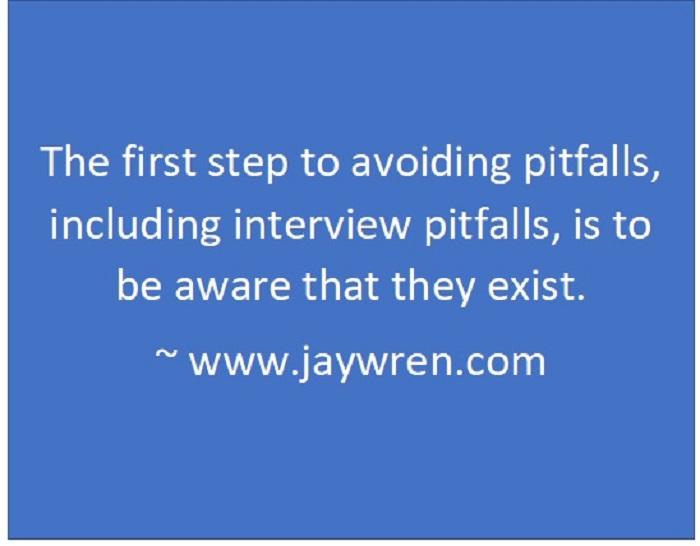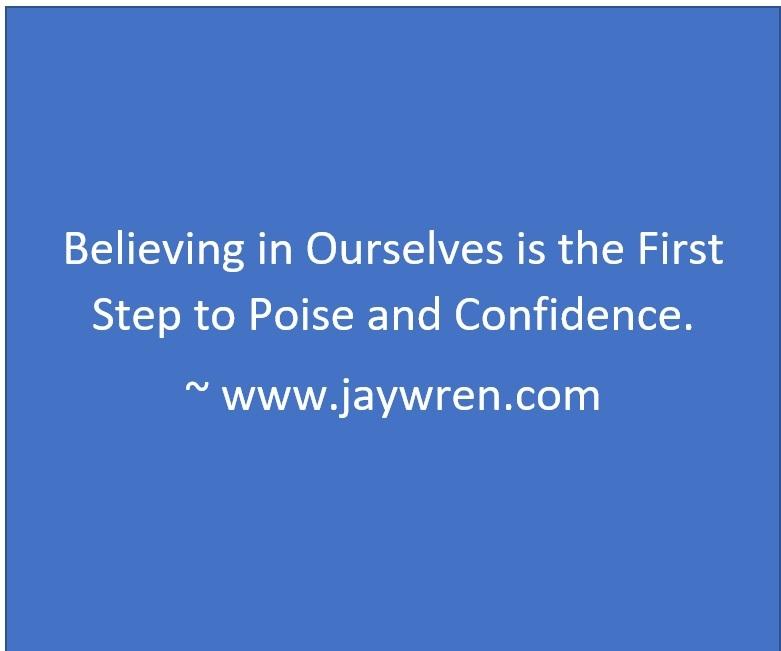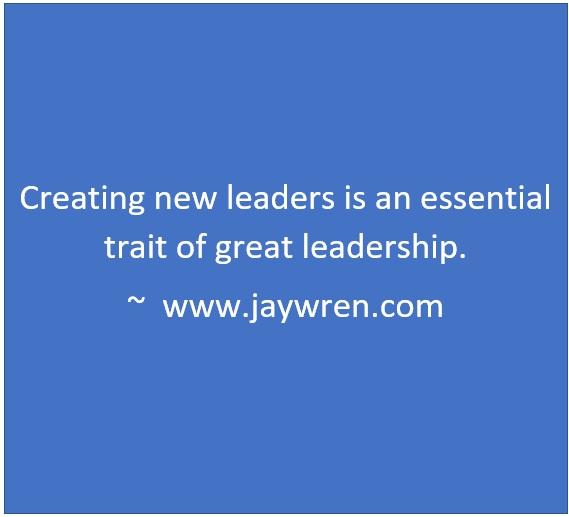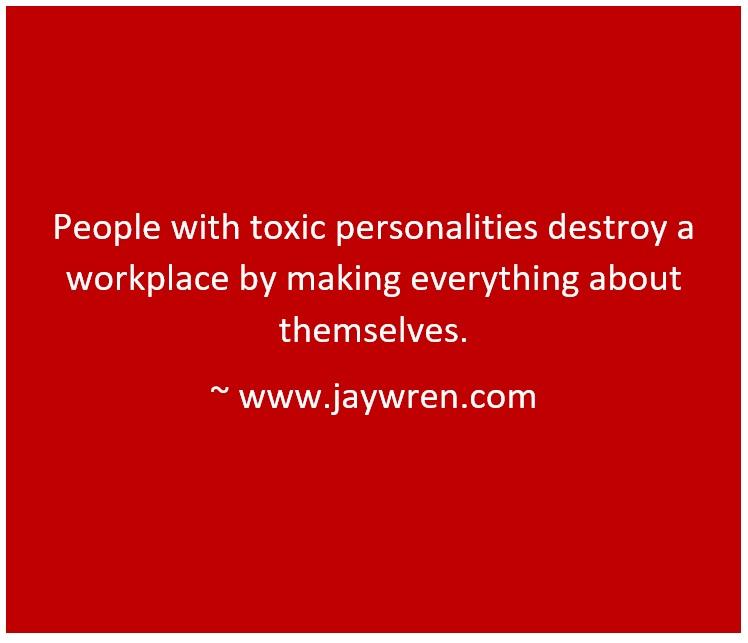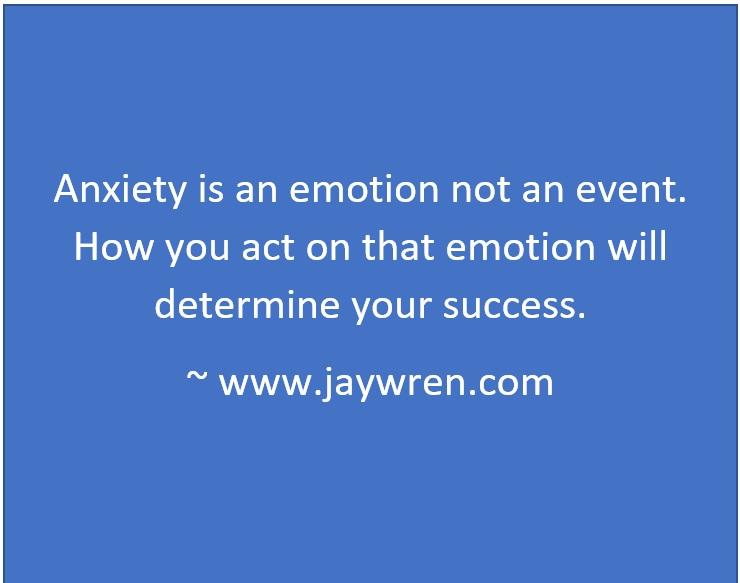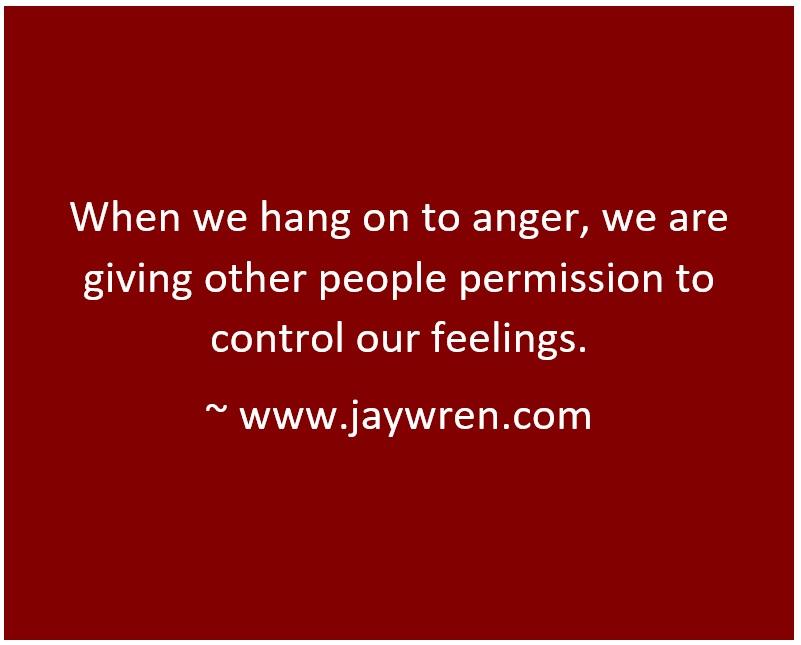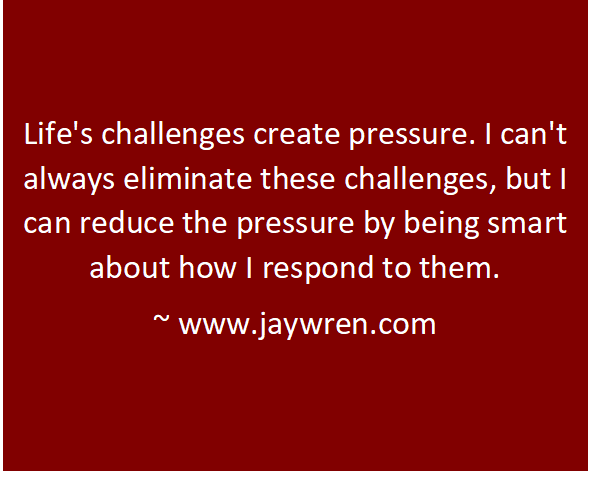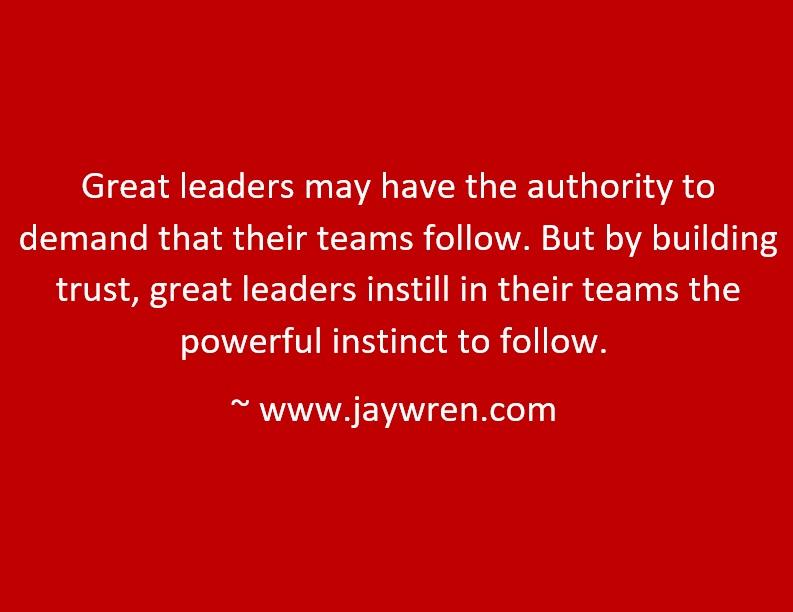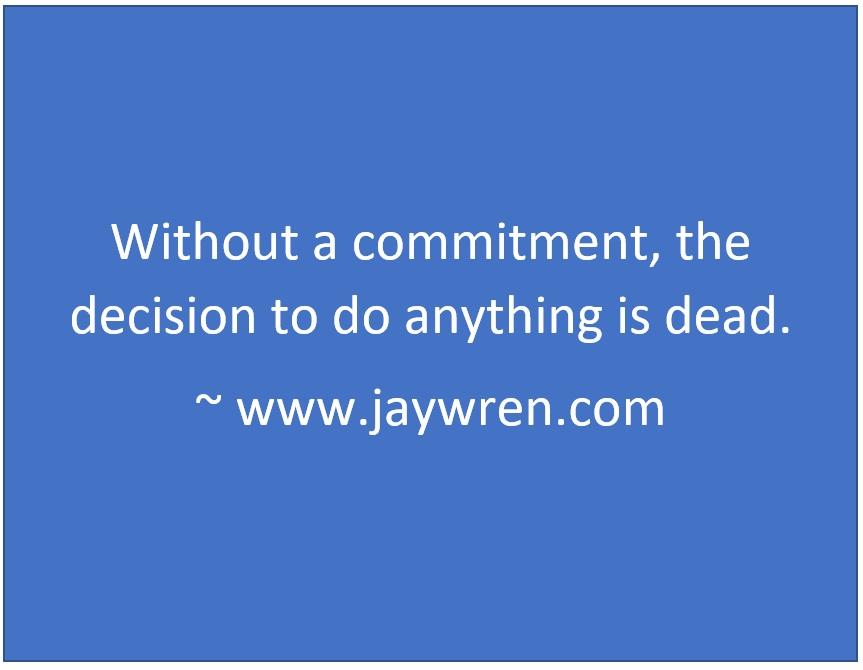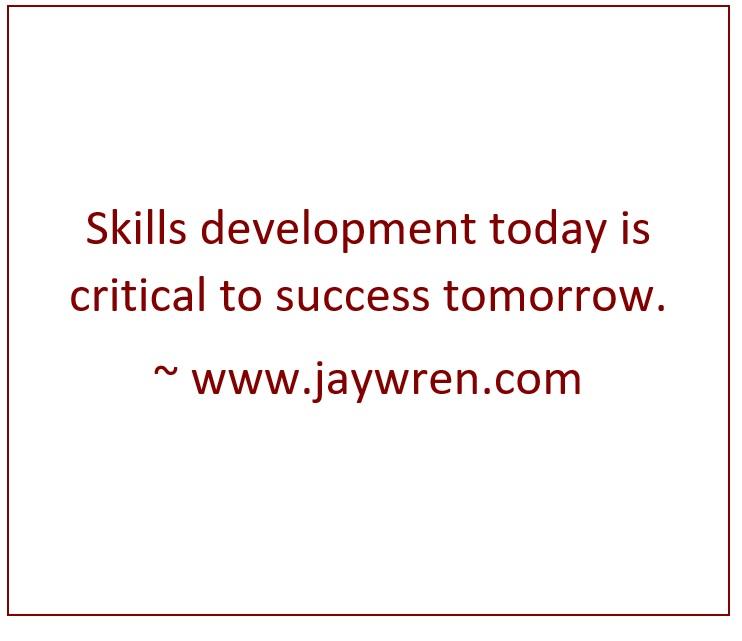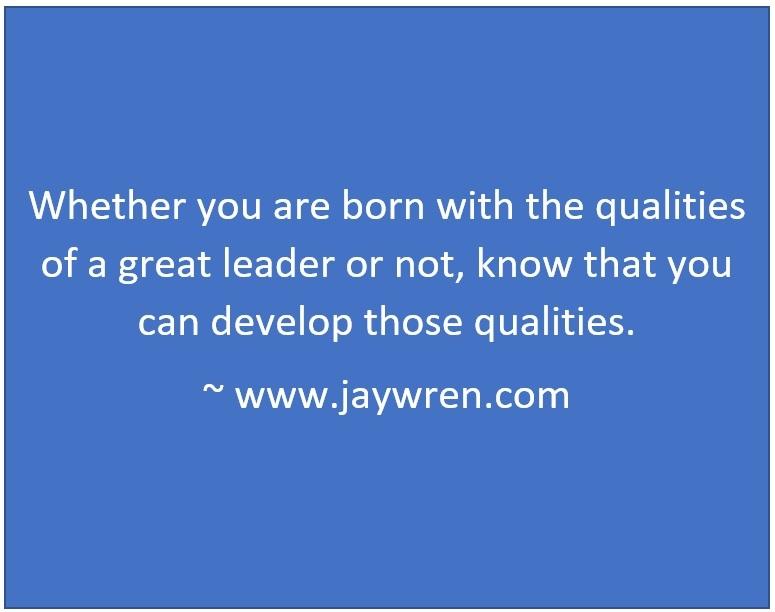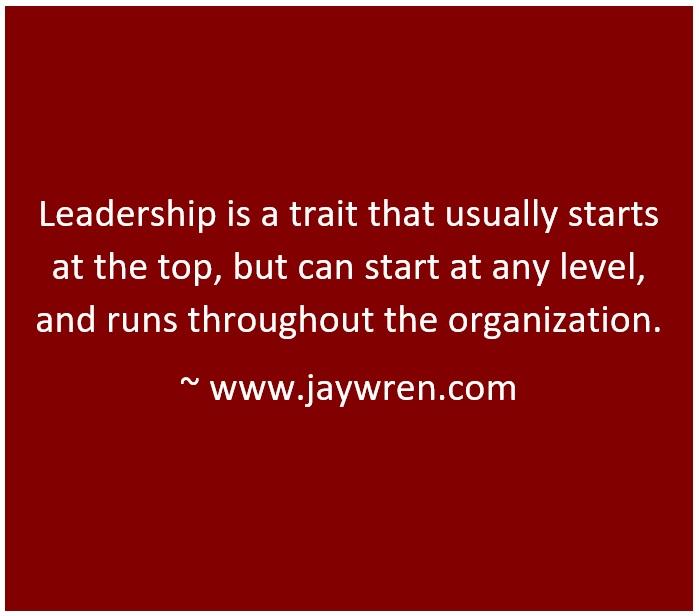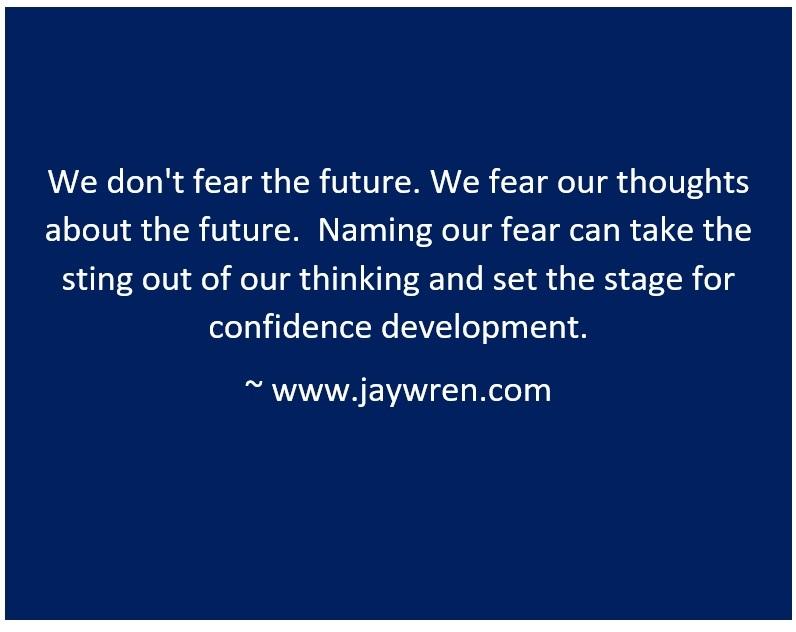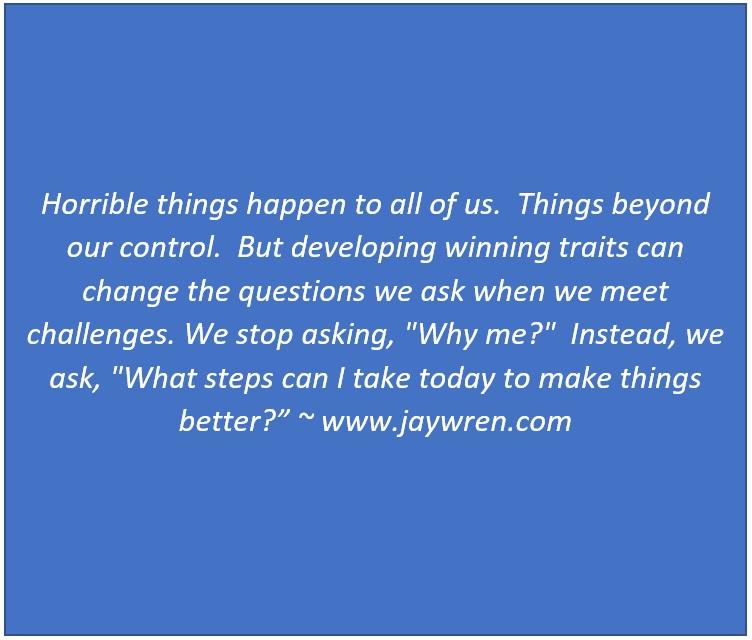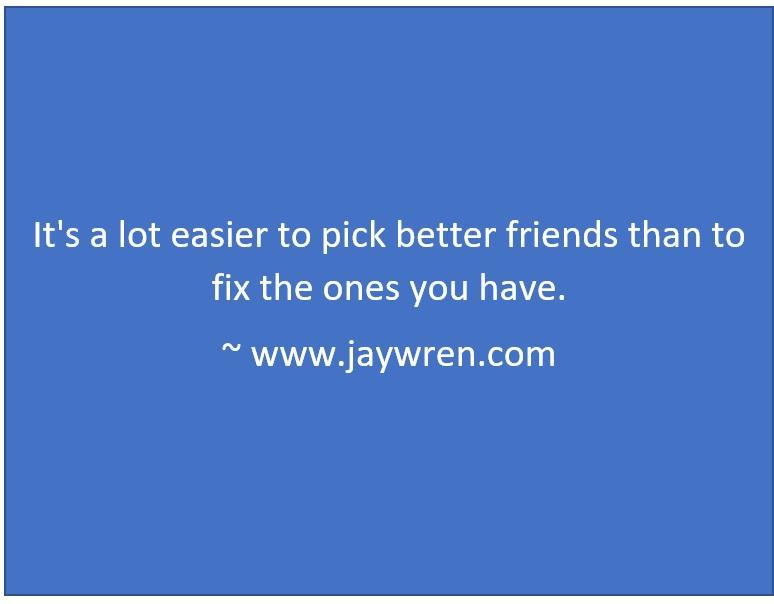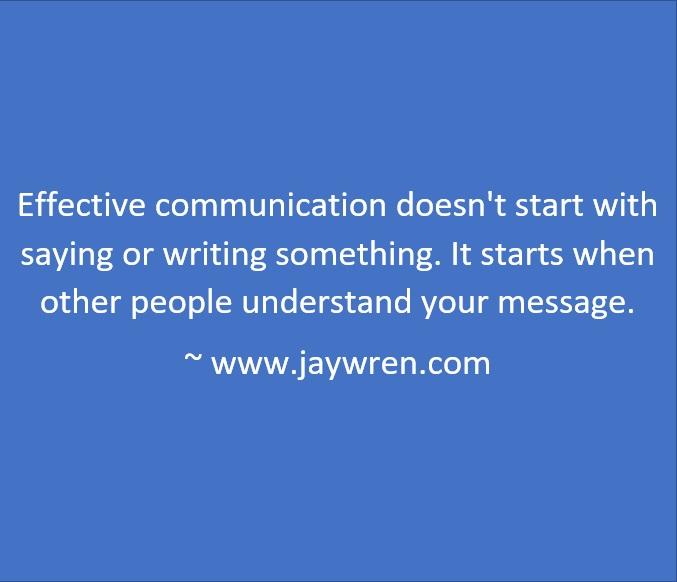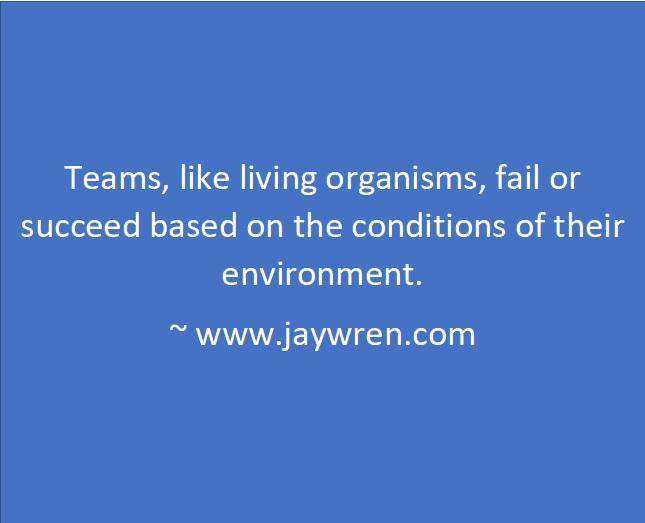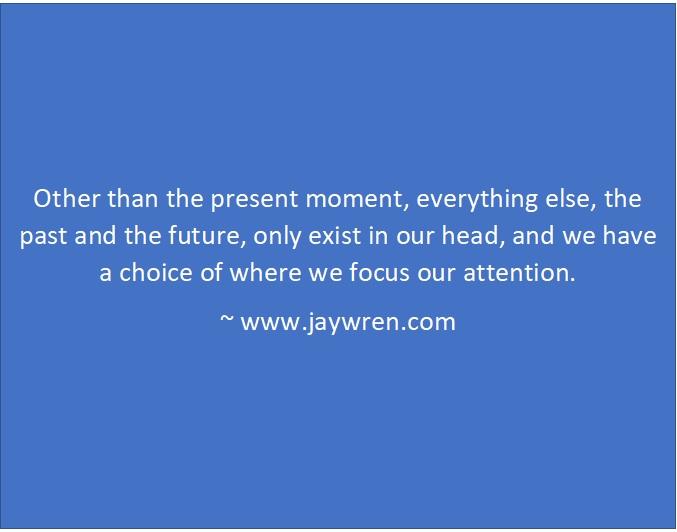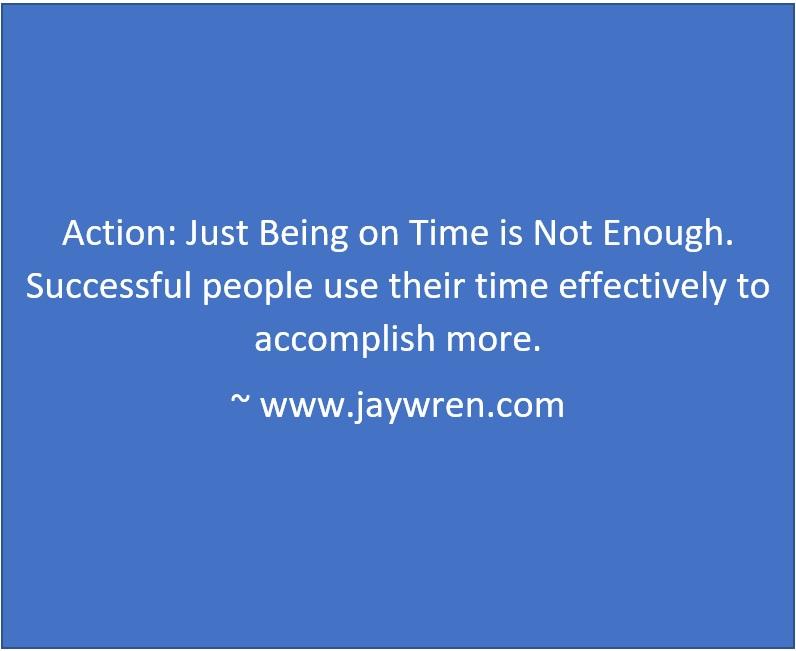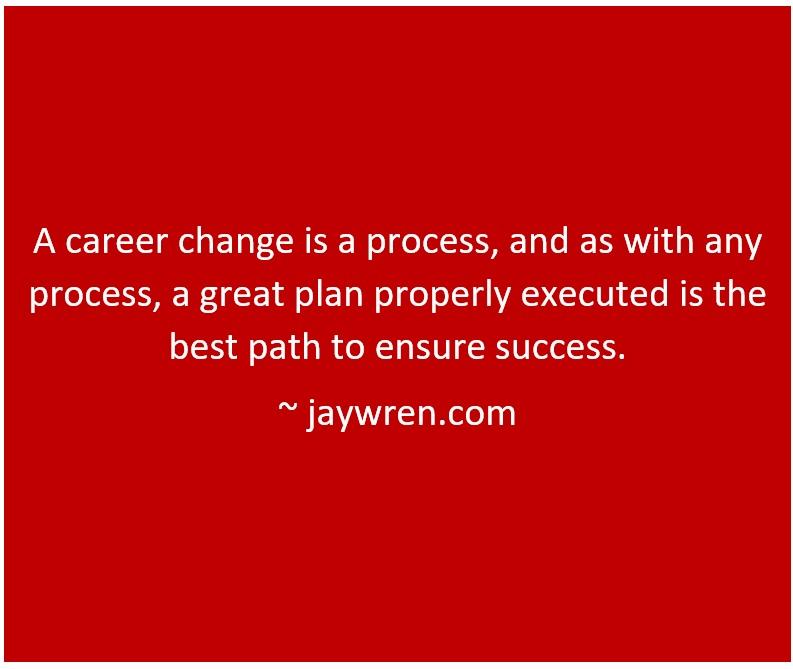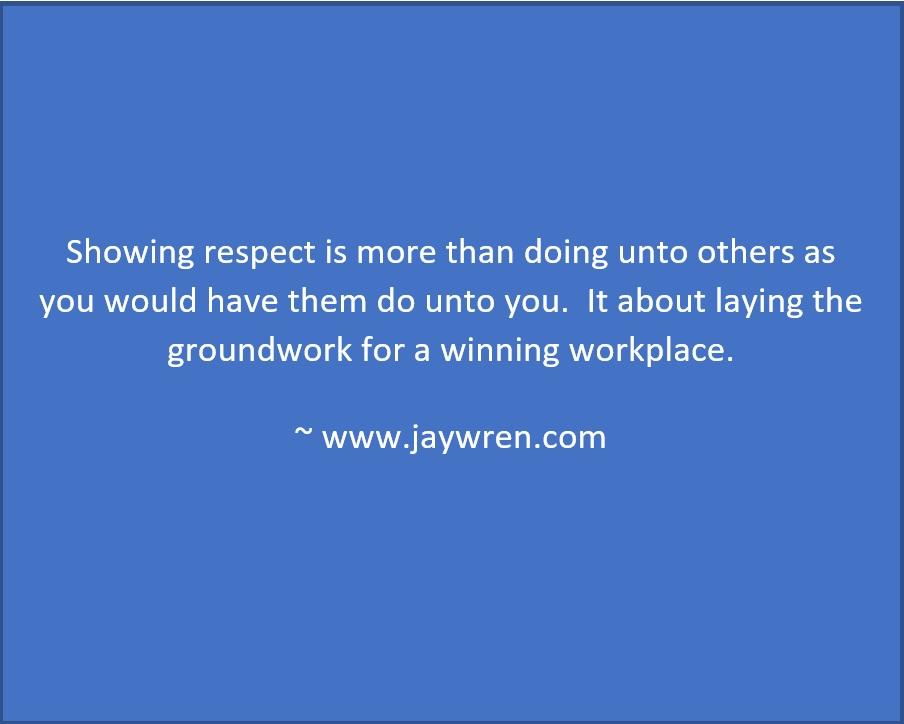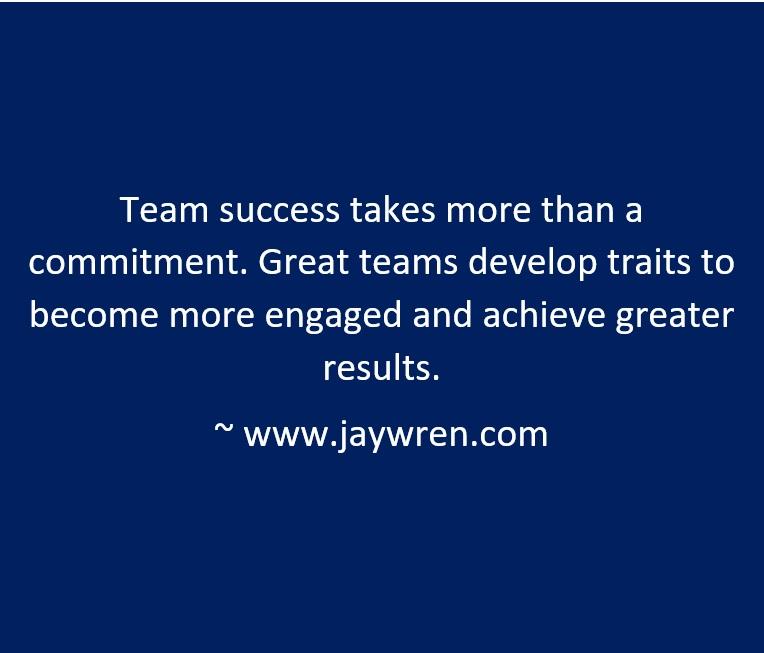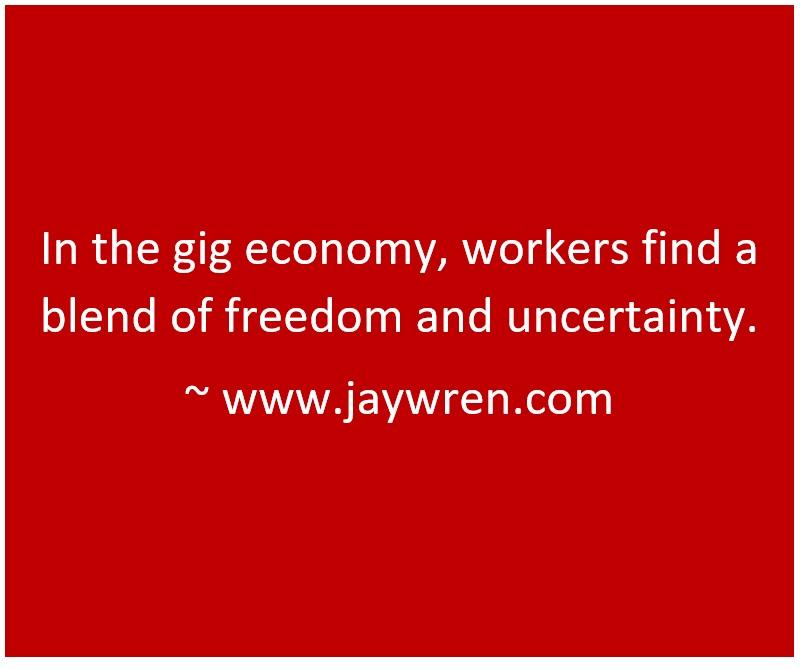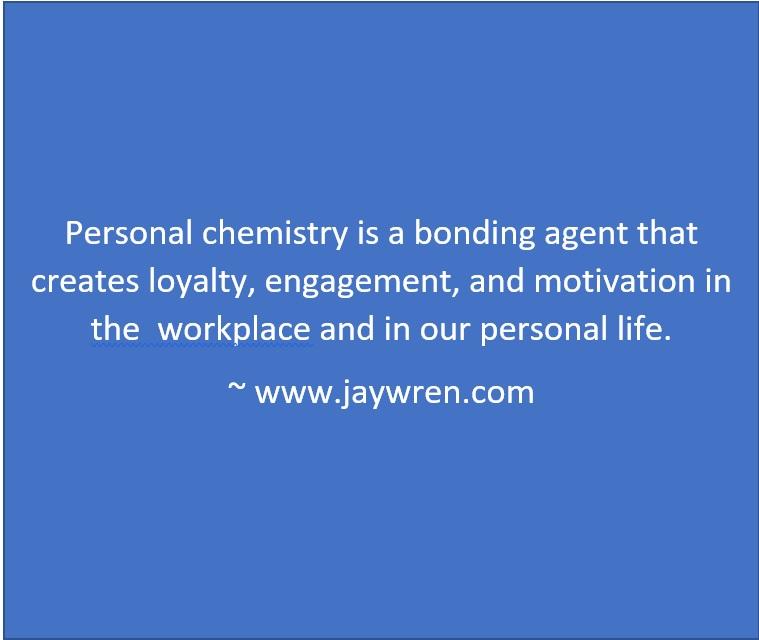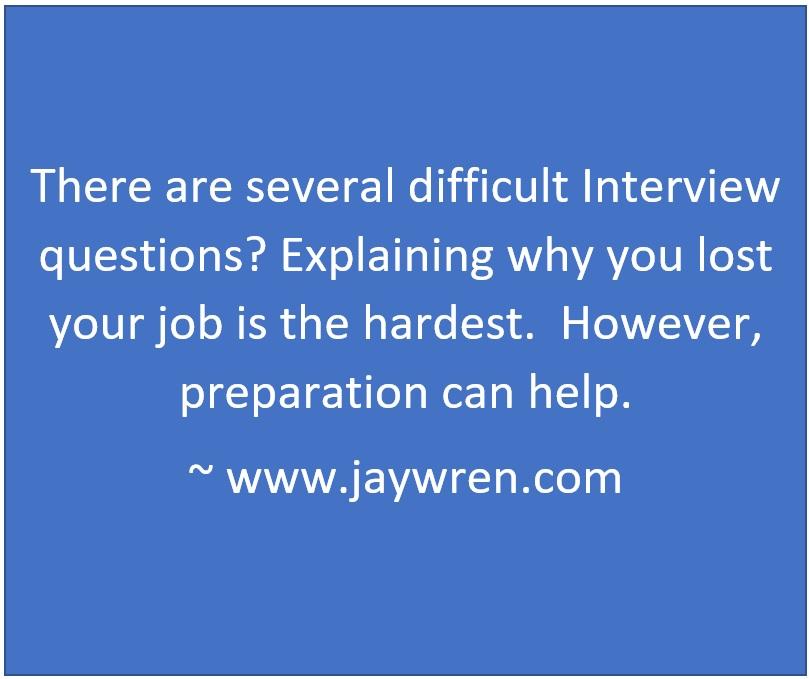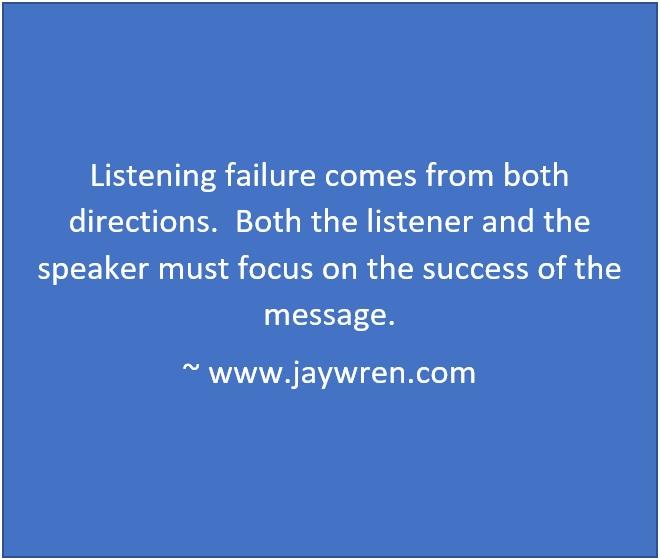Things we don’t think about don’t scare us. ~ www.jaywren.com Who doesn’t have days when we worry about things going badly? We want things and worry that we will not get them. Or, we have things and worry that we will lose them. Living in fear of what might happen is pointless and painful. The…… Continue reading How to Stop Scaring Ourselves with Our Thinking
Category: Success
Creating Relationships with Influencers
Your network is your sphere of influence. ~ www.jaywren.com One powerful way to gain recognition is to have influential people write or talk about you. If you know people in any form of media, consider whether those people might help you gain recognition. A simple technique that I used at one time was to have…… Continue reading Creating Relationships with Influencers
The Simple Steps to Success in Virtual Interviews
A successful virtual (or phone) interview carries as much weight as an in-person interview. Without success in either one, you cannot move ahead in the interview process. In any interview, you need to know what to expect and how to prepare for the interview discussion. Additionally, in a virtual phone or virtual interview, you need…… Continue reading The Simple Steps to Success in Virtual Interviews
Winning Team Members
There are many traits of winning team members. Here are six of the best traits. Mistakes Team members own their mistakes. Everyone makes mistakes. On winning teams, the members admit them and do not repeat them. Additionally, these members immediately correct their mistakes. Without delay, they move the team along successfully. Job Description Winning team members know…… Continue reading Winning Team Members
Self-comparisons
Self-comparisons are normal, but not always healthy. For some people, success comes early and appears to be easy. Some tech entrepreneurs become billionaires in their twenties. Often, entertainers become famous and wealthy as children. Athletes become millionaires in their late teens and early twenties. Measuring our success against the success of these people is flawed.…… Continue reading Self-comparisons
The Direction of My Day
The direction of my day begins with the thoughts that I reject or embrace as I become awake. From there, the success of my day comes from how I turn these thoughts into actions. Ruminating There is a difference between planning and ruminating. When I am planning, I am actively engaged in the present moment.…… Continue reading The Direction of My Day
New Directions: You Got This
New Directions Along the way, my career has taken new directions. As an undergraduate student, I had planned to become a college professor. However, the military obligation I faced required that I serve in the military. Even though I had never been at sea and had no college preparation for Officer Candidate School, I chose…… Continue reading New Directions: You Got This
A Lifetime of Success
Long-term success comes from a lifetime of repeating daily steps. www.jaywren.com Long-Term Success: What are the things that successful people do to build a long-term career? Can you do these things? Can you repeat them throughout yourcareer? During three decades working as a corporate recruiter, I saw people do many things to create successful careers.…… Continue reading A Lifetime of Success
Starting Now, Act on Opportunities
Starting Now: Remember, success does not come from trying to change things we can’t control. Success comes from acting on the opportunities in front of us. www.jaywren.com Technology creates changes. Innovation creates changes. Attitudes create changes. Economics creates changes. Mergers, acquisitions, and consolidations create changes. The unknowns will create changes that we can imagine.However, people…… Continue reading Starting Now, Act on Opportunities
How to Meet Deadlines
A deadline is not a wall for failure. It is the door to success. www.jaywren.com Some projects require months, even years to complete. How do successful people meet deadlines and achieve success with long-term projects? This article lists some ideas that you might find helpful. Daily Reminders, Project Managers, Lists, Clutter, Priorities, One Step Daily Reminders…… Continue reading How to Meet Deadlines
Overcoming the Fear of Being Wrong
Do you fear being wrong? That fear is normal. With a little understanding and simple habits, you can manage that fear. You can become more confident. Your mind will become clearer. Moreover, you will make better decisions and respond more effectively to the people around you. The Origin of our Fear Conditioned from the crib,…… Continue reading Overcoming the Fear of Being Wrong
For Successful People, School is Never Over
For successful people, school is never over. They learn as if they will live forever. Developing new skills will increase your potential for success. You will be able to contribute more greatly at your current job. Additionally, new skills can increase your value when you start to look for a job. Staying current on changes…… Continue reading For Successful People, School is Never Over
6 Tips for a Gold Medal Performance Review
Your performance review affects your promotions, your pay raises, and your job security. Go for a gold medal review. www.jaywren.com Management Changes As managers come and go or as you move to different responsibilities in your company, the things in your performance review are the documentation that you need to keep your career on track…… Continue reading 6 Tips for a Gold Medal Performance Review
Great Direction Focuses on Solutions
The Best Direction Tells People What to Do A guest lecturer at one of my undergraduate classes put a note on the chalkboard and quickly erased the note and posted a different note. Then she apologized. She said that she had just broken a basic principle of teaching. That is, only show people the information…… Continue reading Great Direction Focuses on Solutions
Lifetime Career Success Requires the Power to Grow
Lifetime Career Success: Building a successful career is a continual process of expanding your skills and your network. Don’t fear change. Embrace it. Move beyond your comfort zone. Self-doubt is a sign that I am growing. With growth, I gain greater confidence and marketability. The Texas Ice Houses At one time, ice houses sold one…… Continue reading Lifetime Career Success Requires the Power to Grow
How to Turn Down A Job Offer
5 Things Not to Discuss in Your New Workplace
If we say things that offend people at work or in our businesses, we hurt our co-workers, our employees, our employers, and ourselves. The things you say are things that show commitment, loyalty, and enthusiasm. They create esprit de corps. The purpose of the workplace is to work. When team members talk about the job…… Continue reading 5 Things Not to Discuss in Your New Workplace
Expand Your Qualifications with New Skills
Is there a job you would like to have but do not have the skills for that job? Perhaps there is even a job in your current company that you would like to do if you were qualified. Find ways to develop those skills. First, Find the Skills that You Need. Online Job Descriptions People…… Continue reading Expand Your Qualifications with New Skills
The Stress of a Job Change
Just the process of seeking a new job requires effort and creates stress. Meeting new people in networking and interviewing is stressful for most people. If you have a job, making interviews with another company creates the stress of getting away from your work without being discovered. Along with normal life experiences of getting married,…… Continue reading The Stress of a Job Change
Income and Job Changes
If a hiring manager or recruiter calls you and you have no interest in making a job change but would like to begin to develop a relationship so that you can have people to contact for future needs, you are smart to avoid a discussion of income. These people have no need to know your income…… Continue reading Income and Job Changes
Decisions and Teams
Job Offer Questions: 6 Questions to Ask before Accepting a Job Offer
Offer Questions: Mutual understanding starts with great questions. Here are questions you should ask before accepting a job offer. When a company makes offers you a job, you have done a lot of work. Writing your resume, scheduling interviews, company research, job interviews, follow up, and other steps along the way. Now you are in…… Continue reading Job Offer Questions: 6 Questions to Ask before Accepting a Job Offer
Resigning Gracefully: The Do’s and Don’ts of Leaving a Company
A former employer is a future reference. Leave them with a smile. www.jaywren.com Resigning Gracefully: When you’re leaving a company, knowing how to say goodbye gracefully is important. Using the following steps will reduce the stress for you and avoid burning bridges with the company you are leaving. Review You Decision Before resigning, once again…… Continue reading Resigning Gracefully: The Do’s and Don’ts of Leaving a Company
Wrongful Termination: You’re Fired. Now What?
Wrongful termination is a legal issue. I am not a lawyer (IANAL). I read questions on Internet forums every day. Often these questions are about handling termination situations. A Company fires a person. The person goes on the Internet to get advice on suing the company that fired them. The people responding with advice don’t always give…… Continue reading Wrongful Termination: You’re Fired. Now What?
8 Priorities for Starting a New Job
Starting a New Job The first few weeks in starting a new job are critical. You must establish yourself as a great hire. Moreover, while people are forming impressions of you as a new hire, you are faced with many challenges. To deal with the challenges, the first step is learning what to expect. The…… Continue reading 8 Priorities for Starting a New Job
Job Search Keywords and Refinements
Keywords and Refinements: Search engines are like people in that they are more effective when they can understand what you are asking them to do. ~ www.jaywren.com Making your job search more effective, using search engines. Search engines return resumes based on keywords. Keywords and Refinements Start your internet search with job title, company, or other…… Continue reading Job Search Keywords and Refinements
Powerful Resumes
Mental Strengths: Aligning Your Career to the Way You Think
Mental Strengths: Some people are stronger at solving problems with one correct answer. They are convergent thinkers. Other people are stronger at solving problems with multiple solutions. They are divergent thinkers. Aligning your career with the way your brain works will increase your ability to excel in the workplace. How can you shape your career around…… Continue reading Mental Strengths: Aligning Your Career to the Way You Think
Synergy versus Silos: Increasing Your Company’s Success
Synergy versus Silos: Synergy is the process of combining the efforts of individuals or organizations to operate at level greater than the combined talent of the individual members. The whole is greater than the sum of its parts. Said another way, in this process, teams produce greater results together than the total combined results of…… Continue reading Synergy versus Silos: Increasing Your Company’s Success
Happiness and Joy: Steps for Finding Happiness Now
Don’t Wait for Success to Find Happiness. Happiness and Joy don’t happen in the past or the future. Everything can only exist here and now. Becoming happy and finding joy today gives us energy and brings joy to our lives. The past and the future are just thoughts. They are only as real as we…… Continue reading Happiness and Joy: Steps for Finding Happiness Now
Education and Your Job Search
Education requirements vary. The requirements vary by the job type. Additionally, education requirements vary from job sector and from one employer to the next. This article shows you how to prepare for presenting your education to get the maximum interviews. Understanding Education Requirements Knowing the education requirements of any job is important. Before going to…… Continue reading Education and Your Job Search
Career Strategy: Creating a Powerful Plan for Your Success
Career Strategy: Where do you start in creating a strategic plan that is tailored for you? What do you need to know about adjusting your plan to an ever-changing job market? Check-off List A career plan creates a check-off list. Through this check-off list, you will create focus and direction. Your intuition can emerge to…… Continue reading Career Strategy: Creating a Powerful Plan for Your Success
Thinking: Learning how to Manage the Pain Between our Ears
Thinking: Happiness is easy when everything is going our way. However, we can suffer, even when have everything we want. By managing our thinking, we can find joy from learning how to think about our world. Thinking: Learning how to Manage the Pain Between our Ears Being happy is a normal. Staying unhappy is not.…… Continue reading Thinking: Learning how to Manage the Pain Between our Ears
Career Plan Benefits: Understanding the Process
Career Plan Benefits: a great career plan is an opportunity map. As your career advances, industry will change. Your career plan must be flexible to adjust to changes in industry. With an updated plan, you will discover new roads for opportunities to success. Great career plans not only define where you want to go. The…… Continue reading Career Plan Benefits: Understanding the Process
Leadership Development: A Four-Step Process for Success
Leadership Development: How can companies hire and train people to become leaders? Here are four steps to effective leadership development. Companies that produce great leaders become greater companies. ~ www.jaywren.com Leadership Development — Four Steps Creating future leaders is critical to the long-term growth of a company. An element in succession planning, creating leaders from…… Continue reading Leadership Development: A Four-Step Process for Success
At Your New Job, Treat Every Meeting as a Job Interview
At Your New Job, Treat Every Meeting as a Job Interview Once you land a job, you are competing with other people inside and outside your company to keep your job and to progress in your career. If you want job security and, especially if you want to get promoted, treat each day as a…… Continue reading At Your New Job, Treat Every Meeting as a Job Interview
How to Lose Friends and Followers on the Internet
Losing friends and followers on the Internet is much easier to do than increasing friends and followers. Here are things I try to do to build my network. Trolling and Trolls I love Internet forums. I read forums for fun and for information. But forums have a sneaky way of getting readers into a blind…… Continue reading How to Lose Friends and Followers on the Internet
Thank You Letters When You Get Rejected
Sending a thank you letter after a job rejection offers several benefits. Here are three. You not only reinforce your interest in the job, but also create positive relationships with the people you met in the interviews. Some of the people you met may think of you for future opportunities at the same or other…… Continue reading Thank You Letters When You Get Rejected
Interview Pitfalls: Why Did You Leave Your Last Job?
Interview Pitfalls: If you are unemployed, the reason you left your last job may be important to the hiring company. The interview pitfalls are creating impressions that you have done something wrong. Your answers can help the interviewer learn several important things about you. Therefore, create your answers based on what you believe the interviewer…… Continue reading Interview Pitfalls: Why Did You Leave Your Last Job?
How to Handle Hard Interview Questions
Hard interview questions: The most difficult interview questions are open-ended. These questions require a discussion to answer. They give the interviewers more detailed, meaningful answers. Additionally, open-ended questions display your ability to think and to express yourself effectively. By contrast, the easier questions are closed-ended questions. These questions have yes-no or simple fact answers. Examples:…… Continue reading How to Handle Hard Interview Questions
Why Should We Hire You?
Knowing how to show why the company should hire you is simply to succeeding in an interview. Furthermore, preparing to answer this question creates a framework to help you prepare to interview for any job. This question challenges you to think about your qualifications as they offer value to the hiring company. The Competition You…… Continue reading Why Should We Hire You?
How to Turn Job Interview Jitters into Poise and Confidence
Job Interview Jitters: At a time when you want to feel confident, you are tense and uncomfortable. Believe in yourself. Take these simple steps to create poise and confidence. Believing in Ourselves is the First Step to Poise and Confidence. ~ www.jaywren.com Job Interview Jitters and Stage Fright Stage fright comes from thinking about ourselves. However,…… Continue reading How to Turn Job Interview Jitters into Poise and Confidence
Interview Attire: Dressing to Get the Job
Interview Attire: Different companies have different dress codes. Nonetheless, each company has attire that is standard in their workplace. Moreover, making a point to understand the hiring company’s dress codes will help you feel more comfortable when you walk in the door for a successful interview. Dress at or Above the Company Dress Standards Sometimes,…… Continue reading Interview Attire: Dressing to Get the Job
Job Interview Preparation: The 3 Things You Need to Know
Job Interview Preparation: Are you frustrated with rejection when you have the qualifications for the job? Understanding these three elements will help you understand what happens in an interview. Moreover, these steps will help you prepare for a successful meeting with a future employer. There are three distinct elements in preparing for an interview. Everything…… Continue reading Job Interview Preparation: The 3 Things You Need to Know
Creating Leaders: 4 Elements of Leadership Development
Creating Leaders: How can companies hire and train people to become leaders? Here are four steps to effective leadership development. Companies that produce great leaders become greater companies. ~ www.jaywren.com Creating Leaders — Four Steps Creating future leaders is critical to the long-term growth of a company. An element in succession planning, creating leaders from…… Continue reading Creating Leaders: 4 Elements of Leadership Development
Interview Safety: 4 Steps to Avoiding Risks
Jay Wren The Moveable Career ~ Interview Safety: when you feel safe and comfortable, you will have a better interview. Avoid the risks. Plan for your safety. Here are 4 steps that many job seekers find effective. Location The safety of the interview location is important. Most interviewers will meet with applicants in public locations…… Continue reading Interview Safety: 4 Steps to Avoiding Risks
Elevator Pitch: Bad Presentations Don’t Solve Problems
Elevator Pitch: before you go to an interview, rehearse a short pitch to show how you can create success for the hiring company. Some people call this short pitch, “The Elevator Pitch.” The purpose of an elevator pitch is to persuade a person to accept your proposal in a brief presentation. The best elevator pitches…… Continue reading Elevator Pitch: Bad Presentations Don’t Solve Problems
Toxic Personalities: A Poison in the Workplace
Toxic personalities create stress that spreads throughout an organization. What are the skills that you can develop to survive and even change toxic people? Know What You Can Control If you have the authority to act on the people with toxic personalities, it is your responsibility to change the behavior of these people or remove…… Continue reading Toxic Personalities: A Poison in the Workplace
Fate and Luck: Playing Comes Before Winning
Fate and Luck: Luck comes to those who act. Fate decides who wins. But acting often and acting smarter increases our odds of turning fate in our favor. In life or in cards, we can’t win without playing. ~ www.jaywren.com Fate and Luck I have had good luck and bad luck. But without work, I…… Continue reading Fate and Luck: Playing Comes Before Winning
Network Event Anxiety: Tools and Skills for Success
Network Event Anxiety: becoming effective at networking events may require that you step outside of your comfort zone. Meeting new people, especially for introverts is never easy. At times, extroverts feel awkward when networking. Feeling uncertain in new situations is common, perhaps even normal. Preparation for Overcoming Network Event Anxiety Talking with strangers is easy…… Continue reading Network Event Anxiety: Tools and Skills for Success
Anger Prevention: How Small Steps Can Help You Decompress
Anger Prevention: Anger is a normal feeling when we have experiences that threaten our beliefs or possessions. We can learn skills that give us a choice in the way we respond to that feeling. Anger Prevention: Different Triggers for Different People We all have individual triggers. I say individual triggers, because different things create different…… Continue reading Anger Prevention: How Small Steps Can Help You Decompress
Stress Reduction for a Clear and Productive Mind
Stress reduction: Life’s challenges create pressure. I can’t always eliminate these challenges, but I can reduce the pressure by being smart about how I respond to them. Action I feel stress when I put things off. To overcome procrastination, I simply agree to do one small thing. A common example is to go for a…… Continue reading Stress Reduction for a Clear and Productive Mind
Building Trust and the Role of this Trait in Leadership
Building Trust: What makes trust so valuable in leadership? What is the role of this trait in the relationship between leaders and their teams? Great leaders may have the authority to demand that their teams follow. But by building trust, great leaders instill in their teams the powerful instinct to follow. ~ www.jaywren.com Building…… Continue reading Building Trust and the Role of this Trait in Leadership
Poise: Steps to Confidence and Increasing Your Potential
Poise is not always automatic. Nearly everyone feels uncertain and lacks poise from time-to-time. How do successful people restore their confidence and maintain their poise in challenging situations? Poise starts between our ears and spreads through our heart and our gut and then outward through our face and our gestures. ~ www.jaywren.com Situations that Weaken…… Continue reading Poise: Steps to Confidence and Increasing Your Potential
Career Change Commitment: Steps to Stay Engaged
Career Change Commitment: Hunting for jobs take a lot of work. It is easy to let up and let opportunities slip away. Finding a job is a business. Even when business is slow, you can act to increase your success of finding the job you deserve. Here are some things you can do during a…… Continue reading Career Change Commitment: Steps to Stay Engaged
Job Search Websites: Finding the Job You Deserve
Job Search Websites: Job Search Engines, Job Boards, Social Media Sites that List Jobs, and company owned job boards. How they work and where to find them. Even on the Internet, everything is easier to find when you know where to look. ~ www.jaywren.com The Types of Job Search Websites There are four types of…… Continue reading Job Search Websites: Finding the Job You Deserve
Finding New Industries for Your Job Skills
Finding New Industries: If you find that you have skills that are no longer needed in your current industry, it is natural for you to feel discouraged. Skills Requirements Continue to Change The ever-changing employment landscape often leaves people with industry-based skills and no employment market for those skills. If you are one of those…… Continue reading Finding New Industries for Your Job Skills
Bias Dictates the Thoughts that Govern Us
Bias dictates to our reason and wisdom, but is it always bad? What role does it play in decision-making and in governing our actions? Knowing that we have bias and learning how to manage our bias empowers us to act intelligently to the world in which we live. The biggest challenge is managing our bias…… Continue reading Bias Dictates the Thoughts that Govern Us
Rebel: The Power of Being Different
Rebel: The world is full of successful people who conform to the norm. However, a rebel can blow past the norm and change the world. I have never known a rebel who was boring. ~ www.jaywren.com Companies have guidelines and rules. But what do you do when the guidelines block you from achieving your goals?…… Continue reading Rebel: The Power of Being Different
Bad Bosses: How to Excel In Spite of Them
Bad bosses can destroy your career as they make your life miserable before you get away from them. Here are ways you can protect yourself and your career. If you are working for a bad boss, you have my understanding and empathy. I have had a couple of bad bosses. One had no interest in…… Continue reading Bad Bosses: How to Excel In Spite of Them
Leadership Qualities that Create Great Teams
Leadership Qualities: Some teams have a manager but still suffer from a lack of leadership. What qualities help leaders raise the team standards and increase team success? Four Leadership Qualities that Create Great Teams Leaders have many qualities that make them more effective. For example, a leader with charisma easily draws people to them and…… Continue reading Leadership Qualities that Create Great Teams
Wise Choices: Little Adjustments Can Change the Day
Wise choices: Success comes from making wise choices about how to feel and respond to the things that happen to us. When I am having a bad day, I can strain to push myself through the day. Ruminating, sulking, and whining are great ways to stay stuck in a bad day. On the other hand, I…… Continue reading Wise Choices: Little Adjustments Can Change the Day
Leadership Types: Success and Failure
Leadership Types: Leadership is a trait that can start from any place in an organization, but usually starts at the top, and runs throughout the entire organization. Great leaders create great organizations through picking and developing winning teams. Bad leaders can create failure in any organization. Leadership Study from Literature “The Caine Mutiny” is a…… Continue reading Leadership Types: Success and Failure
Confidence Development: Clearing the Mental Clutter of Job Stress
Confidence Development: Stress loves mental clutter. As the pile of clutter grows in a person’s mind, stress becomes more powerful. The clutter creates confusion and undermines our ability for confidence development. Instead of planning for upcoming events, we worry about upcoming events. The growing stress robs our energy. Lower energy leads to inaction, procrastination. Inaction…… Continue reading Confidence Development: Clearing the Mental Clutter of Job Stress
Meeting Agendas: Gaining Control Through Preparation
Meeting Agendas can empower you to set and control the purpose of a meeting as well as the agreements reached during the meeting. Are you tired of meetings that accomplish nothing? These lessons from sales training might help. Case Study During lunch, a field sales manager of a major consumer goods company told me about…… Continue reading Meeting Agendas: Gaining Control Through Preparation
Recruiters: What Job Seekers Need to Know
Recruiters: If you are in a job search, you may find it helpful to understand the relationships of recruiters, hiring companies, and job seekers. As a recruiter, I contracted with over a hundred companies to fill their vacancies. I have friends who are recruiters. My broader understanding of the types of firms started when I…… Continue reading Recruiters: What Job Seekers Need to Know
Success Story: Resumes that Land Job Interviews
Success Story: Is your resume a success story? Have you included job information in a way that makes your job history stand out against the competition? Even employers who do not know what they are looking for are going to get more excited when they read a resume that reads like a success story than…… Continue reading Success Story: Resumes that Land Job Interviews
Winning Traits: Empower Yourself for Success
Winning Traits: What traits do successful people have that empower them for success? Are they traits that you can develop? Horrible things happen to all of us. Things beyond our control. But developing winning traits can change the questions we ask when we meet challenges. We stop asking, “Why me?” Instead, we ask, “What steps…… Continue reading Winning Traits: Empower Yourself for Success
Career Intelligence: Learn as if You Will Live Forever
Career Intelligence is a prerequisite for career agility. “An agile career is the result of an awareness and willingness to learn new skills that increase your value to your current and future employers. ~www.jaywren.com Building a lifetime career is a continual process of expanding your skills and your network. Every single day, innovation changes something…… Continue reading Career Intelligence: Learn as if You Will Live Forever
Accomplishments: Knowing the Purpose of Your Goals
Accomplishments: Why is it that some companies and some people fail to achieve their goals? How can they define their goals better with stating what they hope to accomplish? The Benefits of Knowing What You Want to Accomplish Goals are the things we hope to do. Before we set goals, we should ask ourselves what…… Continue reading Accomplishments: Knowing the Purpose of Your Goals
Choosing Better Friends: Powerful Steps to a Happier, More Successful You
Choosing better friends is more than picking friends you like. And it does not mean breaking ties with friends you cherish. The Experience of Choosing Better Friends As you make better friends, you will drift away from the friends who bring little value or even diminish your life. Rather, choosing better friends is a means…… Continue reading Choosing Better Friends: Powerful Steps to a Happier, More Successful You
Winning Interviews: 5 Steps to Success
Winning Interviews: What can you do to prepare and practice for your job interview? Here are some ideas that will help you. Give yourself an edge over the competition with interview preparation. ~ www.jaywren.com What You Can Anticipate in an Interview No one can know with any certainty what questions to expect in an interview.…… Continue reading Winning Interviews: 5 Steps to Success
Effective Communications: 7 Steps to Being Understood
Effective Communications are part of the job for professionals in all types of fields and responsibilities. Here are 7 ideas for communication success. Headlines Even when speaking, you will help people understanding you with a headline. The headline states the topic. “Bill, let’s talk about the plan for this weekend” is a simple sentence that…… Continue reading Effective Communications: 7 Steps to Being Understood
Winning: 4 Conditions that Empower and Motivate Successful Teams
Winning: The best conditions empower, motivate, and engage teams. Additionally, these conditions create bonds and ownership among the team members. Four Conditions for Winning Teams. Inclusiveness Ownership Recognition Honesty Inclusiveness The words “we,” “our,” and “together” create feelings of membership in a group. Additionally, calling people by their name increases bonds. For example, picture this…… Continue reading Winning: 4 Conditions that Empower and Motivate Successful Teams
Negotiation: Communications with the Intention of Reaching an Agreement
Negotiation begins with the ability to see solutions for the people across the table. Whether you are offering a service or a product, your success will depend on solving problems. The purpose of a negotiation is to reach an agreement that benefits both sides. How do successful companies see, create, present, and deliver solutions? ~ www.jaywren.com…… Continue reading Negotiation: Communications with the Intention of Reaching an Agreement
Mental Flow: Present Moment Awareness Continues Through Time
Mental Flow: Living in the present moment is like riding a canoe. You have control with your paddle, but you ride effortlessly in the river’s current. ~ www.jaywren.com In a previous article, Becoming Aware: The Power of Living in the Present Moment, I wrote, “Doing one thing at a time and clearing my mind of…… Continue reading Mental Flow: Present Moment Awareness Continues Through Time
Becoming Aware: The Power of Living in the Present Moment.
Becoming Aware: Doing one thing at a time and clearing my mind of everything else, these steps empower my mind to a higher level of thinking. Becoming Aware: My Promise to Myself Today I am going to do one thing at a time. I will start the day by going over my plan for the…… Continue reading Becoming Aware: The Power of Living in the Present Moment.
Action: Just Being On Time is Not Enough
Action: Just Being on Time is Not Enough. Successful people use their time effectively to accomplish more. ~ www.jaywren.com Big Projects and Time Management When going through lengthy periods with big projects, I sometimes push aside the big project to do the things that are easy and pressing. I let the most pressing tasks take…… Continue reading Action: Just Being On Time is Not Enough
Career Change Success: The Elements and Actions of Making a Job Change
Career Change Success: In this article you will find powerful tools that others have found helpful in making an effective career move. Career Change Success: 5 Essential Elements Resume Resume Cover Letter Interview and Interview Preparation Thank You Letter Extra Tools and Tips You don’t have to do everything for success. But you do have…… Continue reading Career Change Success: The Elements and Actions of Making a Job Change
Overqualified? How to Get Interviews that Match Your Skills
Overqualified? Are you frustrated, because hiring companies will not see you for jobs you can do easily? You are not alone. Here are the reasons why you are not getting interviews and what you can do about it. The Risks to Employers of Hiring Overqualified People Speaking as a recruiter, I can tell you that…… Continue reading Overqualified? How to Get Interviews that Match Your Skills
Overqualified: How to Get Interviews that Match Your Skills
Overqualified: Are you frustrated, because hiring companies will not see you for jobs you can do easily? You are not alone. Here are the reasons why you are not getting interviews and what you can do about it. The Risks to Employers of Hiring Overqualified People Speaking as a recruiter, I can tell you that…… Continue reading Overqualified: How to Get Interviews that Match Your Skills
Respect: How to Get It and How to Give It
Respect: How do people gain respect and set the tone to create a winning workplace? Here are four steps I have seen that separate workplace winners from the crowd. Showing respect is more than doing unto others as you would have them do unto you. It about laying the groundwork for a winning workplace. ~ www.jaywren.com…… Continue reading Respect: How to Get It and How to Give It
Skills Development: Hard Skills and Soft Skills
Skills development: Skills come in two categories: hard skills and soft skills. In writing you resume and interviewing, you will be more effective when you understand the different types of skills you are listing. Hard Skills You can learn hard skills, and you can learn soft skills. Hard skills are your ability to perform tasks. These…… Continue reading Skills Development: Hard Skills and Soft Skills
Team Success: 5 Traits that Engage and Build Loyalty
Team Success: What traits engage and build loyalty among team members? This article covers five of the traits I have found among successful organizations. Traits of Successful Teams Inclusiveness Ownership Recognition Honesty Communication Inclusiveness The words “we,” “our,” and “together” create feelings of membership in a group. Additionally, calling people by their name increases bonds.…… Continue reading Team Success: 5 Traits that Engage and Build Loyalty
Do You Have a Powerful Headline for Your Resumes and Online Profiles?
Do You Have a Powerful Headline for Your Resumes and Online Profiles? Headlines sell. They convince hiring managers and recruiters that reading your resume is worth their time. ~ Jaywren. Stick to the names of people, places, things, or ideas. Add action words: increased, doubled, succeeded. Skip opinion words: excellent, outstanding, experienced. Examples Of Powerful…… Continue reading Do You Have a Powerful Headline for Your Resumes and Online Profiles?
Leadership Development: 4 Steps to Creating Future Leaders
Leadership Development: How can companies hire and train future leaders? Here are steps companies can take to strengthen company leadership for the long term. The Four Steps to Creating Future Leaders Creating future leaders is critical to the long-term growth of a company. ~ www.jaywren.com Hire for leadership Establish Authority & Responsibility Teach for leadership Increase…… Continue reading Leadership Development: 4 Steps to Creating Future Leaders
Powerful Headlines for Resumes and Online Profiles
Powerful Headlines serve several purposes. One purpose is to catch a person’s attention in a way that the person reads your content. A second purpose is to create a memorable impression in the reader’s mind. Headlines sell. They convince readers that your content is worth their time. Professional headlines convince hiring managers that you have…… Continue reading Powerful Headlines for Resumes and Online Profiles
U.S. Small Business Administration: Government Support for Entrepreneurs
USA Small Business Administration helps entrepreneurs plan, launch, manage, and grow their business. Two government web pages that will help you find support for your business are “U.S. Small Business Administration: Start and Grow Your Business” and “USA.gov: Small Business” “Small businesses make up: 99.7 percent of U.S. employer firms.” SBA.gov U.S. Small Business Administration…… Continue reading U.S. Small Business Administration: Government Support for Entrepreneurs
Sharing Economy: Finding Gigs for Your Assets and Skills
The Sharing Economy: The purpose of this article is to help job seekers find income quickly and help employed people quickly find supplemental income. With the Internet expansion and coincidental high unemployment from the 2008 recession, companies began to spring up to connect personal asset sharing with consumers. The development of phone applications has increased…… Continue reading Sharing Economy: Finding Gigs for Your Assets and Skills
Entrepreneurs: Is It Time to Start Your Own Business?
Entrepreneurs accept greater risks to operate their own business. In return, successful entrepreneurs can enjoy greater independence over their activities, greatly increase their income, and gain greater control over how and where they do business. Entrepreneurs: Is it Time for You to Start Your Own Business? Prior to entering recruiting, I worked for two terrific…… Continue reading Entrepreneurs: Is It Time to Start Your Own Business?
Career Inside Track: Testing Driving a Job while Gaining Experience
Career Inside Track: As a job seeker, you will face a number of challenges. Here are three of them. First, knowing whether they are looking at the right job. Second, gaining the experience employers are seeking. Third, getting to know people who can help them on the inside of a company. Here five ways you…… Continue reading Career Inside Track: Testing Driving a Job while Gaining Experience
Stay Flexible: Career Assessment is an Ongoing Process
Stay Flexible: Becoming established in your career gives you success and security. But the world changes. Industries change. Career opportunities change. What should you be doing in a world of career uncertainty? Stay Curious and Aware Remain curious. Accept the realities of an ever-changing world of business. You might need to return to college or obtain…… Continue reading Stay Flexible: Career Assessment is an Ongoing Process
Personal Chemistry: Creating Bonds in Job Interviews
Personal Chemistry: Are you finding that your interviews are not landing you jobs where you have solid qualifications? Could it be that you are not developing personal chemistry with the hiring managers? Chemistry over Qualifications For some hiring managers, the chemistry they feel with the applicant influences their hiring decisions as much the applicant’s skills,…… Continue reading Personal Chemistry: Creating Bonds in Job Interviews
Winning Resumes that will Land You a Job Interview
Winning Resumes: Working through stacks of resumes, hiring managers and recruiters only spend seconds deciding whether to save you resume or delete it. You need to know how to write resumes employers will want to read. The best resumes show why you are the most qualified candidate for the job. ~ www.jaywren.com Thirty Years of Reading Resumes…… Continue reading Winning Resumes that will Land You a Job Interview
Hardest Interview Question: “Why Were You Fired?”
Hardest Interview Question: “Why were you fired?” How do you handle the most difficult question in interviewing? How do you prepare your answer? How do you deliver it? There are several difficult Interview questions. Explaining why you lost your job is the hardest. However, preparation can help. Write down and rehearse your answer. Do not…… Continue reading Hardest Interview Question: “Why Were You Fired?”
Fridays Just Feel Good. Carpe Diem!
Loving the present moment. Working on turning It every day into Friday.
Powerful Resumes: The Critical Details for Getting Job Interviews
Powerful Resumes: Are you sending out dozens of resumes and not getting job interviews. Here are some resume basics that will increase the power of your resume. Truth and Accuracy Lying or stating inaccurate information on your resume can cost you an interview. Furthermore, lies can live forever. Six months into the job, your employers might…… Continue reading Powerful Resumes: The Critical Details for Getting Job Interviews
Attitude: You Own It. Make It Amazing.
Attitude: How is it that some people remain calm, positive, and objective, when life gives them challenges and hurdles? Is this powerful trait of attitude management is a teachable skill. Understanding Moods and Attitudes When I am in hungry, tired, or rushed, things can seem more personal. I may feel more anxious or impatient.…… Continue reading Attitude: You Own It. Make It Amazing.
Listening Failure: Reasons Great Ideas Are Never Heard
Listening Failure: What makes us ineffective listeners? What are solutions to overcoming listening failure? Here are steps for more effective communication. The Value of Overcoming Listening Failure Effective listening is important in all parts of our lives. In our personal relations, effective communications can help us build strong, long-term bonds. In networking, effective communications can…… Continue reading Listening Failure: Reasons Great Ideas Are Never Heard
